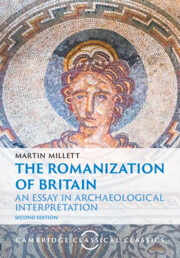Book contents
- Frontmatter
- Dedication
- Contents
- Illustrations
- Tables
- Foreword
- Preface
- Introduction: The Romanization of Britain in perspective
- 1 The Nature of Roman Imperialism
- 2 The Pattern of Later Iron Age Societies
- 3 The Invasion Strategy and Its Consequences
- 4 The Emergence of the ‘Civitates’
- 5 The Maturity of the ‘Civitates’
- 6 Development at The Periphery
- 7 The Developed Economy
- 8 Later Roman Rural Development
- 9 Epilogue: Decline and Fall?
- References
- Index
4 - The Emergence of the ‘Civitates’
Published online by Cambridge University Press: 02 January 2025
- Frontmatter
- Dedication
- Contents
- Illustrations
- Tables
- Foreword
- Preface
- Introduction: The Romanization of Britain in perspective
- 1 The Nature of Roman Imperialism
- 2 The Pattern of Later Iron Age Societies
- 3 The Invasion Strategy and Its Consequences
- 4 The Emergence of the ‘Civitates’
- 5 The Maturity of the ‘Civitates’
- 6 Development at The Periphery
- 7 The Developed Economy
- 8 Later Roman Rural Development
- 9 Epilogue: Decline and Fall?
- References
- Index
Summary
Rome’s activities in other provinces and the way she acquired her overseas territories indicate how she worked towards circumscribed self-government in provincial administration. In the western and north-western provinces the development of the civitas system enabled Rome to fulfil her requirements by the incorporation of conquered tribes in a way analogous with the polis. Although the geographical areas covered by these civitates were larger than those of the territories of the Mediterranean city states, they could be treated like units of government with each civitas representing a unit of population, inhabiting a territory. This was administered by a council (curia), comprising landowning aristocrats (decuriones), which met at a town within the territory. This settlement was the administrative capital, and thus the focus for the population. The essence of the concept of the polis was thus also the essence of the civitas: town and country were subsumed within the same constitutional concept which, in the case of Britain, was normally equated with the tribe.
- Type
- Chapter
- Information
- The Romanization of BritainAn Essay in Archaeological Interpretation, pp. 65 - 103Publisher: Cambridge University PressPrint publication year: 2025

